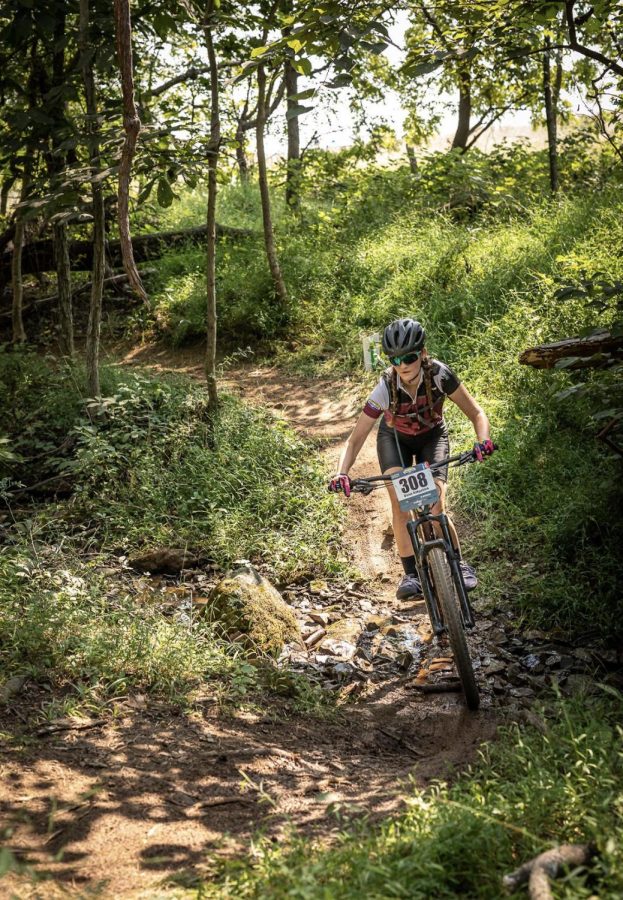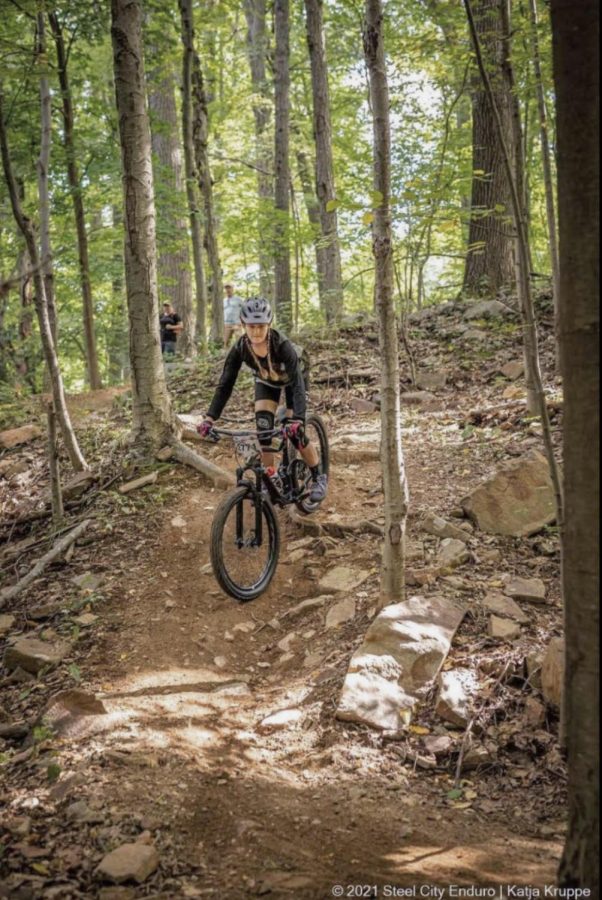Kirkpatrick bunny hops over double standard
January 23, 2022
This previously ran in our December 2021 print issue.
In her first year of competitive mountain biking, sophomore Vivian Kirkpatrick expected to face some challenges.
Yet, one she didn’t quite anticipate was a double standard.
Immediately, those running the team envisioned her racing in a beginners division, largely because she was a woman.
“I remember when I first joined the team they wanted to put me in [a] lower skill division,” sophomore Kirkpatrick said. “And I remember I had to fight for them and go on rides to prove that I was skilled enough to ride in the skill division I’m in.”
Kirkpatrick went on to have a successful season riding alongside a largely male team throughout the year, enough so that she earned 4th in the state. This came as a shock to her, as she did not believe she would be able to attain this in her first year of competing.
“You always have to prove people wrong since it’s such a male-dominated sport,” Kirkpatrick said.
Although this is her first year competing, Kirkpatrick’s love for mountain biking started when she was six years old thanks to the influence of her dad, who used to mountain bike. As her dad would race up and down the mountains, little Vivian would be on the sidelines watching in awe.
Kirkpatrick has faced long, grueling hours of training. However, she thought of her vigorous training as simply another way that she can “…take it by storm”.
One of the many things that she has to do to prepare for competition is what is called “night training.” On the mountains at night, Vivian and her teammates race up the mountains with their headlamps as the only source of light. During her season, she averages around 12 miles a day just for training. Her training regimen consists of three hours of biking four times a week.
During competitions, Kirkpatrick competes in endurance races and cross country races. So while everyone is enjoying their coffee on a Saturday morning, Kirkpatrick is flying up and down the side of mountains, soaring over rocks and roots.
“Imagine looking down a trail, and you can’t see the trail, and it’s just rocks or it’s just vertical climbs, or jumps where you’re trying to go over a gap that you need to get over… people don’t realize. Sometimes it’s just like ‘hold on and figure [it] out’ and hope you don’t die,” Kirkpatrick said.
Kirkpatrick has had her fair share of cuts, bruises, and broken bones. She expressed that oftentimes during training she has crashed, but this does not stop her from competing and pursuing her love for the sport.
When she came face to face with a setback of a physical illness, she pushed through it.
“It was more of a mental game. I really wanted to quit but I just pushed through it,” Kirkpatrick said.
Even though she was fighting a strong mental game, she ended up placing 5th overall.
Since mountain biking is a relatively rare sport, Kirkpatrick has formed lifelong friendships with a small number of fellow competitors. Since she travels all around the East Coast for competitions, she has met people from many different states, as well as, other mountain bikers from all around the world. Although Kirkpatrick has made many friends from all around the world, she has felt like she has missed many social events in her hometown.
While many would think that mountain biking is a cheap sport, in reality, it is not. On average, one competition-grade bike can cost $8,000. Kirkpatrick flies down the mountains on a Liv Intrigue bike. Depending on the conditions of the mountains, Kirkpatrick has 10 different tires that she cycles through during a competition.
In the end, Kirkpatrick would like to go to college and compete in mountain biking. It is her dream to one day make it to the Cup and the Olympics.












